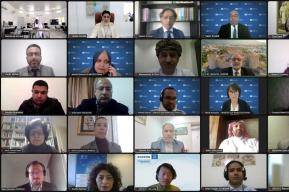Article
30 African countries mobilized towards the future UNESCO Framework on Culture and Arts Education

Diverse expertise from Africa was mobilized for the inclusive consultation process, which focused on the future of culture and arts education. Government representatives, practitioners, academia, civil society, cultural and educational institutions, regional bodies such as the African Union (AU), and major regional cultural players including the African Academy of Languages (ACALAN), the International Research and Documentation Center on African Traditions and Languages (CERDOTOLA) and the Observatory of Cultural Policies in Africa (OCPA) were in attendance. Organizations of indigenous peoples, minority groups and persons with disabilities were also present.
Under the leadership of the Government of Kenya, the consultation was chaired by Dr Kiprop Lagat, Director of Culture, State Department for Culture and Heritage of the Ministry of Tourism, Wildlife and Heritage of Kenya, and co-chaired by Prof Emmanuel Dandaura, Professor of Development Communication and Performance Aesthetics, Nasarawa State University (Nigeria), in coordination with the UNESCO Regional Office for Eastern Africa and National Commissions for UNESCO in Africa.
The overall aim of the meeting was to assess the impacts of culture and arts education on sustainable development, as well as to identify trends, challenges and opportunities specific to the region in this area. During various thematic sessions, stakeholders shared good practices and highlighted gaps to be addressed.
Strengthening of the interface between culture and education, will not only enhance skills to support the value chains of the cultural heritage sector, but will also enhance knowledge and efforts towards protection and promotion of cultural expressions.
Key areas of focus that will guide the long-term implementation of the Framework include:
- Align the development of new arts education policies with existing ones, while ensuring they cater to all art forms;
- Promote harmonization of curricula across Africa with room for local customization;
- Integrate indigenous knowledge and languages as well as local approaches to learning into curricula and pedagogies, supported by directly engaging custodians of culture;
- Take advantage of the opportunities of the digital era, particularly in connection to the cultural and creative industries
- Invest in capacity building for educators in the field of arts education
- Strengthen partnerships between government, cultural and educational institutions, artists, civil society and the private sector.
The diverse recommendations, contexts, priorities and challenges expressed by African experts will feature in a consolidated report, which, in turn, will feed the future UNESCO global Framework for Culture and Arts Education. This inclusive approach represents UNESCO’s commitment to a robust participatory process that leaves no one behind.






